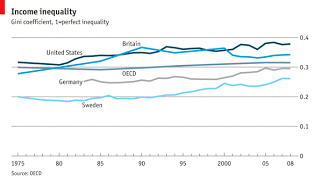Economia
 THE gap between rich and poor has grown ever wider in wealthy countries over the past three decades. A new report by the OECD has reams of data on this phenomenon and is well worth looking at. The Gini coefficient, a measure of inequality in which zero corresponds to everyone having the same income and one means the richest person has all the income, increased by almost 10% from 0.29 in 1985 to 0.32 in 2008, for working-age people in OECD countries. The trend is caused by earnings: the pay of the richest 10% of employees has increased at a far greater rate than that of the poorest 10% of employees. Within the upper echelons, the top 1% have reaped the greatest gains. Technology has disproportionately benefited high-earning workers, who also spend far longer at work than do low-earners. High earners marry other high earners. And governments are doing less to redistribute wealth than they have done in the past. So far, so familiar. But the report also argues that globalisation is not a significant cause of inequality, and that one of the many reasons for the rise in income inequality is that more people are in work now (or at least they were before the financial crisis hit) compared with the 1970s.
THE gap between rich and poor has grown ever wider in wealthy countries over the past three decades. A new report by the OECD has reams of data on this phenomenon and is well worth looking at. The Gini coefficient, a measure of inequality in which zero corresponds to everyone having the same income and one means the richest person has all the income, increased by almost 10% from 0.29 in 1985 to 0.32 in 2008, for working-age people in OECD countries. The trend is caused by earnings: the pay of the richest 10% of employees has increased at a far greater rate than that of the poorest 10% of employees. Within the upper echelons, the top 1% have reaped the greatest gains. Technology has disproportionately benefited high-earning workers, who also spend far longer at work than do low-earners. High earners marry other high earners. And governments are doing less to redistribute wealth than they have done in the past. So far, so familiar. But the report also argues that globalisation is not a significant cause of inequality, and that one of the many reasons for the rise in income inequality is that more people are in work now (or at least they were before the financial crisis hit) compared with the 1970s.
Mais
- Usa 2008: Barack Obama And John Mccain
August 31, 2008 Economic View Is History Siding With Obama’s Economic Plan? By ALAN S. BLINDER CLEARLY, there are major differences between the economic policies of Senators Barack Obama and John McCain. Mr. McCain wants more tax cuts for the rich;...
- Mulheres E O Progresso Econômico Na América Latina
Women key to Latin America economic progress By Stephanie Leutert, CFR Editor's note: Stephanie Leutert is a research associate at the Council on Foreign Relations. This entry of Latin America's Moment originally appeared here. The views...
- Macro Iii - Distriubição De Renda E Patrimônio
Novo estudo mostra para os Estados Unidos que os pobres ficam pobres e os ricas ficam mais ricos: http://rrp.sagepub.com/content/43/4/467.full.pdf+html Who Are the Winners and the Losers? Transitions in the U.S. Household Income Distribution John...
- A Relação Entre "felicidade" E Pib Per Capita Em Poder De Compra
DESPITE the economic gloom, the world is happier than it was before the financial crisis set in (according to a recent poll from Ipsos which surveyed 19,000 adults in 24 countries). 77% of respondents describe themselves as "happy", three percentage...
- O Crescimento Da Desigualdade é Ruim?
Segundo Gary Becker, nem sempre. Should not an increase in earnings inequality due primarily to higher rates of return on education and other skills be considered a favorable rather than unfavorable development? Higher rates of return on capital are...
Economia
Desigualdade salárial aumenta
The Economist online Income inequality is rising in rich countries

Mais
loading...
- Usa 2008: Barack Obama And John Mccain
August 31, 2008 Economic View Is History Siding With Obama’s Economic Plan? By ALAN S. BLINDER CLEARLY, there are major differences between the economic policies of Senators Barack Obama and John McCain. Mr. McCain wants more tax cuts for the rich;...
- Mulheres E O Progresso Econômico Na América Latina
Women key to Latin America economic progress By Stephanie Leutert, CFR Editor's note: Stephanie Leutert is a research associate at the Council on Foreign Relations. This entry of Latin America's Moment originally appeared here. The views...
- Macro Iii - Distriubição De Renda E Patrimônio
Novo estudo mostra para os Estados Unidos que os pobres ficam pobres e os ricas ficam mais ricos: http://rrp.sagepub.com/content/43/4/467.full.pdf+html Who Are the Winners and the Losers? Transitions in the U.S. Household Income Distribution John...
- A Relação Entre "felicidade" E Pib Per Capita Em Poder De Compra
DESPITE the economic gloom, the world is happier than it was before the financial crisis set in (according to a recent poll from Ipsos which surveyed 19,000 adults in 24 countries). 77% of respondents describe themselves as "happy", three percentage...
- O Crescimento Da Desigualdade é Ruim?
Segundo Gary Becker, nem sempre. Should not an increase in earnings inequality due primarily to higher rates of return on education and other skills be considered a favorable rather than unfavorable development? Higher rates of return on capital are...
